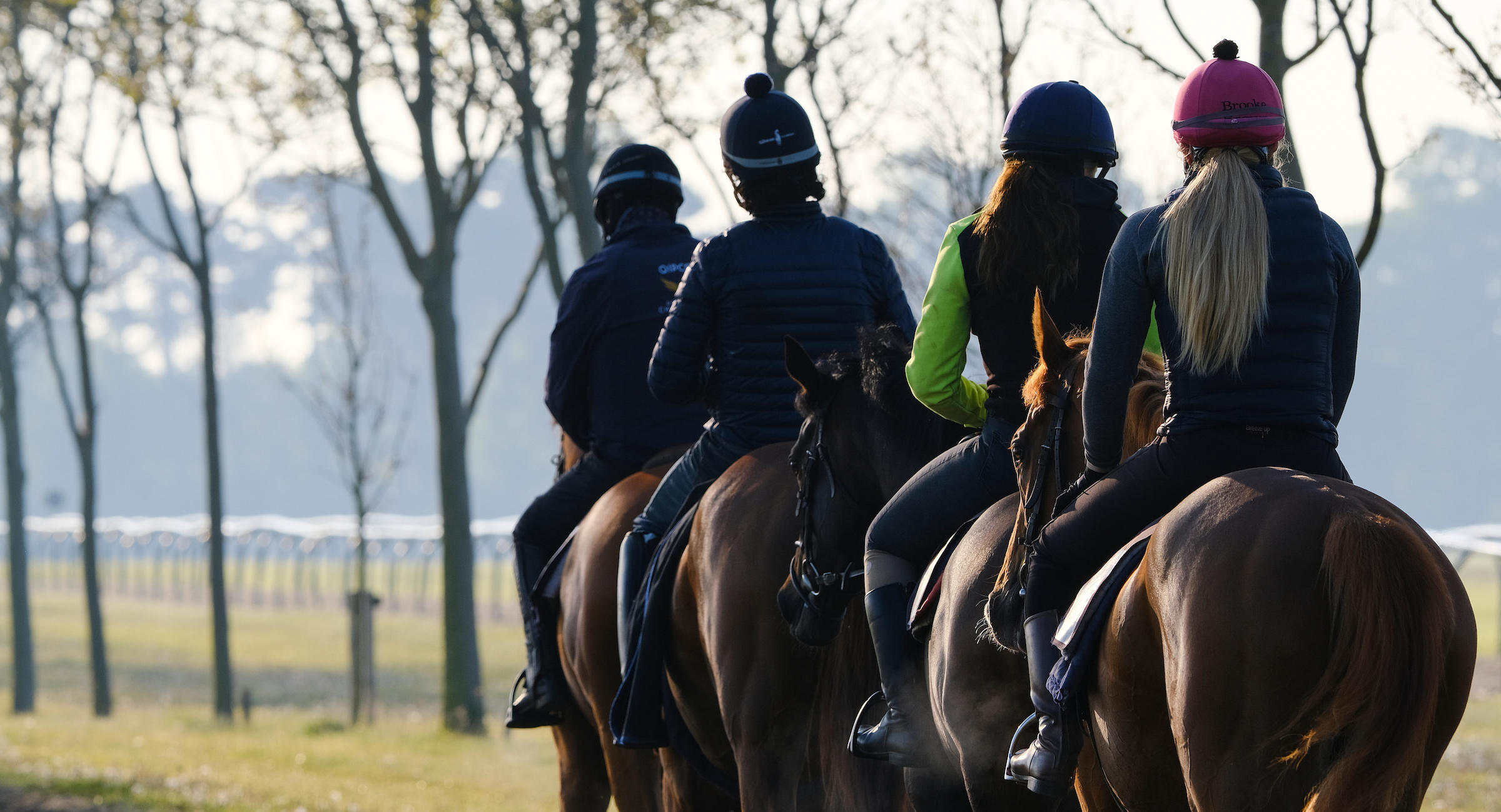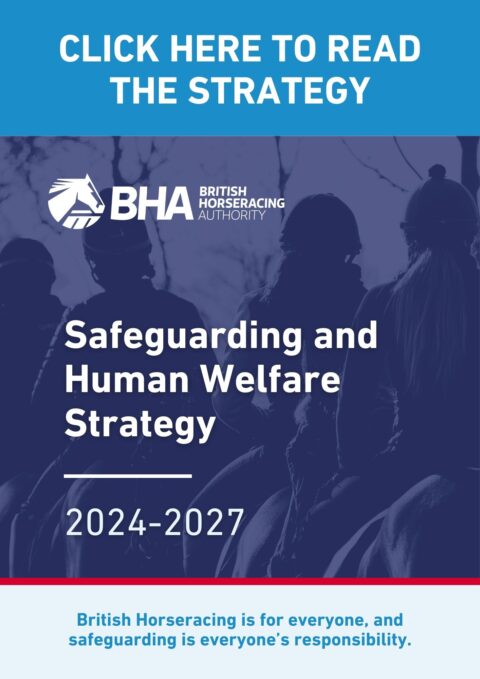
- Updated BHA Safeguarding and Human Welfare Strategy to support improved safety and wellbeing of racing’s workforce
- Action plan aims to protect racing’s people and ensure culture of respect
- Strategy informed by evidence of gender inequalities within the sport, including research from Durham University
- Racing’s leaders apologise to those who’ve experienced unacceptable conduct and reiterate sport’s commitment to the highest standards of behaviour
 The British Horseracing Authority (BHA) has published an updated Safeguarding and Human Welfare Strategy, which seeks to protect and promote the safety and wellbeing of everyone involved in the sport.
The British Horseracing Authority (BHA) has published an updated Safeguarding and Human Welfare Strategy, which seeks to protect and promote the safety and wellbeing of everyone involved in the sport.
Covering an initial four-year period, the strategy sets out immediate and longer-term objectives to ensure a safe, respectful, and enjoyable working environment for all, with the highest standards of behaviour and free from any kind of abuse.
These objectives are supported by a comprehensive action plan, which includes:
- Enhanced safeguarding and human welfare education for industry leaders, employers and employees, with specific training around sexual abuse and misconduct
- Refining reporting mechanisms, simplifying the existing referral processes and ensuring appropriate support for those reporting allegations
- Improving how we manage concerns, so that cases are dealt with effectively, in a sensitive, timely manner and in accordance with regulatory best practice
- Creating a network of ‘Respect in Racing champions’ – role models who can help influence, inform, support and provide confidential advice to others
- An industry-wide awareness campaign to improve understanding of what sexual misconduct is, why it is unacceptable and what to do if it occurs
- Using the latest data and research most effectively to identify, better understand and respond to emerging risks and trends. This includes further research to explore the lived experience of people working in British racing.
The actions build on progress made in recent years by the BHA, employers and others across the industry to ensure compliance with evolving legal requirements, improve working practices, support racing’s workforce and give people confidence to raise issues of concern.
This includes the preventative and investigative work of the BHA’s safeguarding and integrity teams, the expansion of the RaceWISE confidential reporting service and the introduction of an industry-wide Code of Conduct.
The strategy has been informed by data and evidence collected by the BHA over the past five years through its existing reporting mechanisms, enabling a targeted approach based on knowledge and insight.
Since 2018, the BHA has received and investigated over 350 safeguarding and human welfare concerns, a high proportion of which relate to sexual misconduct, bullying and abusive conduct. Recent data shows a rise in the number of referrals concerning complex abuse cases, including serious sexual offences.
This evidence is reinforced by the findings of an independent study into gender inequalities and the experiences of aspirational young women in the racing industry, conducted by Dr Eleanor Boden between 2015 and 2020 as part of her PhD at Durham University.
The study, which was part-funded by the Racing Foundation, sought to gain an insight into the lives and personal experiences of 140 women employed in the industry during the research period. Its findings suggest that:
- Sexual misconduct and gender stereotypes can remain unchallenged or be accepted as ‘banter’
- Attitudes towards pregnancy and motherhood can be an obstacle to career development, especially in more horse-facing roles
- Some young women have felt the need to leave the industry because they don’t believe they belong or will have the opportunity to reach their potential.
The research recommended that more action was needed to improve working practices for women and prevent sexual misconduct, with better support for victims through enhanced education, clearer reporting lines and improved case management.
The PhD was embargoed by Dr Boden to give racing’s leaders an opportunity to review the findings and recommendations and come up with a comprehensive improvement plan. Some of these recommendations have been delivered already, while others have helped shape and been incorporated into the wider Safeguarding and Human Welfare Strategy.
The strategy details the challenges identified, highlights where progress has been made, particularly in recent years, and sets out the areas that must be further strengthened and developed as these issues continue to be addressed.
British racing’s leaders have fully endorsed the strategy, with the actions and objectives approved by the BHA Board and supported by the recently established Industry People Board. The sport has also acknowledged the evidence underpinning the action plan and apologised for the experiences of those working in or involved with the sport who have been subject to unacceptable behaviour.
Work is already underway to implement the agreed actions, coordinated by the BHA and Industry People Board, supported by funding from the Racing Foundation and Horserace Betting Levy Board, and with crucial input from across British racing.
BHA Chair, Joe Saumarez Smith, said:
“British horseracing is dependent on the hard work and dedication of the people who ensure our sport can take place throughout the year. Everyone involved in our industry should feel safe, supported and confident in the knowledge that they will always be treated with dignity and respect.
“We have long stated that ‘racing is everyone’s sport’, but the findings from Dr Boden’s report and the data and evidence underpinning the wider strategy demonstrate that this has not always been the case. Horseracing has at times fallen short and let people down.
“On behalf of British racing, I apologise unreservedly to anyone who has experienced harm and behaviour that is unacceptable. I also want to thank those who have shared their stories and provided powerful personal testimony. We are sorry and we will work determinedly to put this right.
“There is no place in British racing for sexual misconduct, bullying or any form of discrimination or conduct that makes people feel inferior, inadequate or excluded. We must always maintain the highest standards, no matter our role or responsibility, and strive to build a universal culture of respect.
“It is true that we have made significant progress as an industry in recent years. A huge amount of work has been done to improve and modernise our working practices; continually enhance support services; give people greater confidence to report wrongdoing; and bolster regulatory powers so that we can act swiftly and decisively to tackle misconduct.
“There is much more to do, and the updated Safeguarding and Human Welfare Strategy – which has the unanimous support of the BHA Board and racing’s leadership – is another important milestone in this journey”.
BHA Chief Executive, Julie Harrington, added:
“Racing is not immune to problems like bullying and sexual misconduct, and I know that for women in particular, it has often been easier to keep your head down and suffer in silence. I am truly sorry to hear the stories of bullying, sexual misconduct and, in some cases, serious sexual abuse. This has no place in British racing or wider society.
“The onus is on everyone in our sport to put it right. I’m convinced that we have already started to see a cultural shift, where people feel more confident to speak up. This is difficult and takes immense courage, and we must create the environment where unacceptable conduct is called out and those who experience harm are empowered to come forward.
“We have already taken steps to build the foundations where this can be possible, through strengthened reporting lines and investigatory processes, the establishment of a dedicated safeguarding function at the BHA, the industry-wide Code of Conduct, and noticeable progress in improving working practices across the industry.
“Our updated Safeguarding and Human Welfare Strategy can build on and accelerate this work. It can be a watershed moment for our sport, where we collectively commit to the highest standards and take action when our shared values of tolerance and respect are abused.
“This is not only the right thing to do; it is critical if we are to recruit, retain and develop a happy, valued and high-performing workforce – and secure British racing’s sustainable, long-term future.”
Commenting on the sport’s approach, Dr Eleanor Boden, whose research has helped shape and inform the wider strategy, said:
“Society is currently facing multiple challenges and horseracing is not immune to these issues. The sport’s decision to release an updated Safeguarding and Human Welfare Strategy demonstrates a clear commitment to further improving the working practices for all in British horseracing.
“I have been working closely with the horseracing industry since the themes started to emerge within my research, which has allowed the sport to develop and agree a robust action plan, which we have already started implementing, but will be accelerated through the strategy.
“In short, this is a welcome development as part of the need to address as a priority an accepted culture and its associated behaviours, to enable racing’s workforce, and the sport as a whole, to thrive.”
Neil Hayward, Chair of British racing’s Industry People Board, said:
“The Industry People Board sees the publication of Dr Boden’s report and the launch of a new approach to safeguarding and human welfare across racing as an important step. We are encouraged that the sport has published these findings and made a genuine commitment to improving workplace culture. My IPB colleagues and I will be actively involved in overseeing the implementation of this work.
“We also know that other responses are needed to ensure the sport is taking a fully coordinated and long-term approach to supporting our people. This will be at the heart of our industry-wide People Strategy that we expect to publish in the summer. Only by making our sport safer, more welcoming and much more inclusive will racing attract and retain the workforce we are going to need in future”.
If you need help, support or witness or experience any unacceptable behaviour, please report it to [email protected], or call the BHA’s confidential reporting service, RaceWISE on 08000 852 580.
Notes to editors:
1. The BHA’s Safeguarding and Human Welfare Strategy is available here.
2. A summary version of Gender, Education and Work in the Horseracing Industry (2021) can be found here. The research was conducted by Dr Eleanor Boden as part of her PhD at Durham University, under the supervision of Durham’s Professor Stacey Pope and Professor Martin Roderick, and was part-funded by the Racing Foundation. The main aims of the study were to:
- Examine the lived experiences of young women in the horseracing industry
- Consider how young women develop their identities in preparation for the working environment.
- Examine why young female trainees have been less successful than males in their career trajectories.
3. About Dr Eleanor Boden: Eleanor Boden was appointed Chief Executive of the Scottish Racing Academy in 2019 and is responsible for managing its education provision, recruitment strategies and employer engagement. Prior to this, Eleanor has held a number of engagement, education and community roles within the horseracing industry, including with Scottish Racing and Racing To School. She was also yard manager at Cartmel Racecourse and has ridden out for various trainers throughout her career. Eleanor has consistently focused on improving the awareness and understanding of equality, safeguarding and inclusion, to ensure a safe space for participation and the opportunity for all to thrive. In 2021 Eleanor was appointed as the Equality, Wellbeing and Safeguarding Director of Horse Scotland and is the newly appointed chair of the industry’s Diversity in Racing Steering Group.
4. About the Industry People Board: The Industry People Board is the single point of accountability for the industry’s workforce strategies, with its work forming part of the wider Industry Strategy, which racing’s leaders committed to working towards in 2022. It was created to drive racing’s whole people strategy and is Chaired by Neil Hayward.
